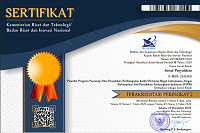PERSEPSI ANAK JALANAN TERHADAP BIMBINGAN SOSIAL MELALUI RUMAH SINGGAH DI KOTAMADYA BANDUNG
Keywords:
Perception, Street Children, Social Guidance, Open House Program
Abstract
The street children has become an important phenomenon in urban areas. Most of the children spent their time on the street or in other public areas. Government throught Social Welfare Departement developed an transit house program which providing social guidance fo ther street children, but the budget can not cover all of the children. Many of the children are still on the street that cause them to be out of control and easily trapped in juvenile delinquency. The study tried to understand perception of the children on the social guidance of the transit house program, since there are not enough information about the issue. The study used quantitative and qualitative data and analized in non parametric statistic. Bandung was selected as location of the study since the city is one of cities in Indonesia that has street children problems. Population of the study are street children of 6-18 years old. Stratifield random sampling technique was used to get 60 respondents. The data was collected through interview schedule, field observation and desk study. The research fond that the perception of the respondents toward social guidance program is negative in terms of physical, mentality, social and skill. But, the respondent that involved in the program less or equal to 6 months is better than whose that involved 7-12 months and more than 13 months, especially in terms of mental and skill guidance. Based on the finding, a reorientation of the program is needed throught in form of guidance and councelling package that short in time (less than 6 months), relevance with interest and talent of the children, emphasize on developing the children skill, but still concern with physical, mental and social development.Downloads
Download data is not yet available.
Published
2005-03-01
How to Cite
TjahjoriniS., SlametM., AsngariP. S., & SusantoD. (2005). PERSEPSI ANAK JALANAN TERHADAP BIMBINGAN SOSIAL MELALUI RUMAH SINGGAH DI KOTAMADYA BANDUNG. Jurnal Penyuluhan, 1(1). https://doi.org/10.25015/penyuluhan.v1i1.2094
Section
Articles
Authors who publish with this journal agree to the following terms:
- Authors retain copyright and grant the journal right of first publication with the work simultaneously licensed under a

This work is licensed under a Creative Commons Attribution 4.0 International License that allows others to share the work with an acknowledgement of the work's authorship and initial publication in this journal. - Authors are able to enter into separate, additional contractual arrangements for the non-exclusive distribution of the journal's published version of the work (e.g., post it to an institutional repository or publish it in a book), with an acknowledgement of its initial publication in this journal.
- Authors are permitted and encouraged to post their work online (e.g., in institutional repositories or on their website) prior to and during the submission process, as it can lead to productive exchanges, as well as earlier and greater citation of published work (See The Effect of Open Access).















